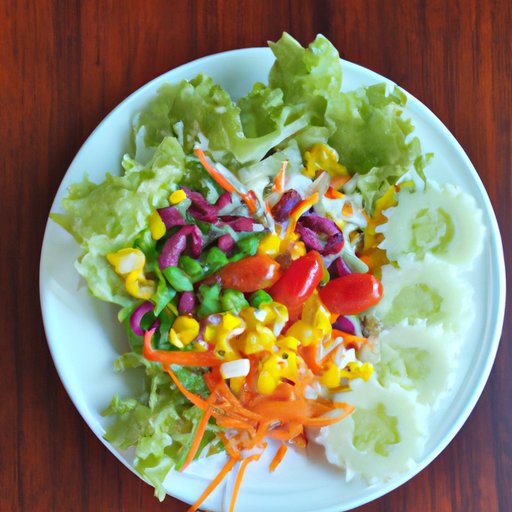
Introduction
Have you ever noticed that after eating a salad, you suddenly feel the urge to use the bathroom? Or maybe you’re someone who struggles with constipation and wonders if adding more salad to your diet could help regulate your bowel movements? The connection between diet and digestion is complex, and understanding how salad impacts our gastrointestinal system is no exception.
In this article, we’ll explore the relationship between salad consumption and bowel movements. We’ll discuss the science behind digestion and how salad affects the digestive system differently from other foods. We’ll also take a closer look at the role of gut bacteria and bowel movements and discuss the benefits and drawbacks of eating salad for digestive health. By the end of this article, you’ll have a better understanding of how salad can impact your digestive system and how to optimize your diet for a healthier gut.
The Surprising Connection: How Salad Can Affect Your Digestive System
In order to understand how salad affects the digestive system, it’s important to first understand how digestion works. When we eat food, it travels through our digestive tract and is broken down by digestive enzymes. The food is then absorbed into the bloodstream and distributed throughout the body.
Salad is unique because it contains a high amount of fiber. Unlike other foods that are broken down and absorbed quickly, fiber takes longer to digest and moves more slowly through the digestive system. This slow-moving process can have a significant impact on digestive health.
Fiber helps to promote healthy digestion by regulating bowel movements, promoting the growth of beneficial gut bacteria, and reducing inflammation in the gut. However, consuming too much fiber too quickly can also lead to discomfort and digestive issues like bloating and gas. This is why it’s important to gradually increase fiber intake and drink plenty of water while consuming salad.
The Truth About Salad and Bowel Movements
Bowel movements are the body’s way of eliminating waste and toxins from the digestive system. The frequency and consistency of bowel movements can vary from person to person and can be influenced by a variety of factors, including diet.
Consuming a diet high in fiber, including salad, can lead to more frequent bowel movements. This is because fiber helps to add bulk to stool and promotes healthy bowel movements. However, it’s important to note that consuming too much fiber too quickly can have the opposite effect and lead to constipation.
On the other hand, some people may experience less frequent bowel movements when consuming salad. This can be a result of consuming too little water or not consuming enough fiber overall. However, if you’re experiencing discomfort or pain during bowel movements after consuming salad, it’s possible that you may be experiencing some digestive issues like irritable bowel syndrome or a food intolerance.

What Your Poop Can Tell You About Your Salad Consumption
Believe it or not, the appearance and consistency of poop can reveal a lot about your diet and digestive health. Healthy poop should be easy to pass, well-formed, and medium-brown in color.
However, if you’re experiencing changes in your poop after consuming salad, it could indicate that you’re consuming too much or too little fiber. Loose, watery stools may be a sign of consuming too much fiber, while hard, lumpy stools may be a sign of not consuming enough fiber.
If you’re experiencing discomfort or pain during bowel movements after consuming salad, it’s possible that you may be experiencing some digestive issues like irritable bowel syndrome or a food intolerance. In this case, it’s important to speak with a healthcare provider to determine the root cause of your symptoms.
Salad and Your Gut: Exploring the Connection
Gut bacteria play a critical role in digestion and overall health. Consuming a diet rich in plant-based foods like salad can help promote the growth of beneficial gut bacteria, which can lead to improved overall health and wellbeing.
However, it’s important to note that consuming too much salad or consuming it too quickly can also have a negative impact on gut bacteria. This is because consuming too much fiber too quickly can lead to microbial imbalances in the gut, which can have negative effects on digestive health.
The Benefits and Drawbacks of Eating Salad for Your Digestion
Eating salad can have numerous benefits for digestion and overall health. Consuming a diet high in fiber can help regulate bowel movements, promote healthy gut bacteria, and reduce inflammation in the gut.
However, there are also drawbacks to consuming salad for digestion. Consuming too much fiber too quickly can lead to discomfort and digestive issues like bloating and gas. Additionally, some people may experience discomfort or pain during bowel movements after consuming salad, which could indicate other digestive issues like irritable bowel syndrome or a food intolerance.
Is Salad the Key to a Healthy Gut (And More Regular Poops)?
While consuming salad can have numerous benefits for digestion and gut health, it’s important to note that it’s not the only way to achieve a healthy gut or regular bowel movements. Consuming a balanced diet that includes a variety of fruits, vegetables, whole grains, and lean proteins is key to supporting overall digestive health.
Other ways to improve gut health and regularity include exercising regularly, staying hydrated, and managing stress. Additionally, probiotics and prebiotic-rich foods like kefir, yogurt, and sauerkraut can also help promote healthy gut bacteria and improve digestive health.
Why Salad May or May Not Be Contributing to Your Digestive Issues
If you’re experiencing digestive issues after consuming salad, it’s possible that it may not be the only factor contributing to your symptoms. Other factors like stress, lack of exercise, and other dietary habits can also play a role in digestive health.
If you’re experiencing persistent symptoms like pain, discomfort, or changes in bowel movements after consuming salad, it’s important to speak with a healthcare provider to determine the root cause of your symptoms.
Conclusion
Salad can have a significant impact on digestive health, but it’s important to consume it in moderation and gradually increase fiber intake to avoid discomfort and digestive issues. By following a balanced diet, staying hydrated, and managing stress, you can support overall digestive health and achieve more regular bowel movements.
While there’s no one-size-fits-all solution to digestive health, understanding the connection between diet and digestion is the first step in optimizing your diet for a healthier gut.





